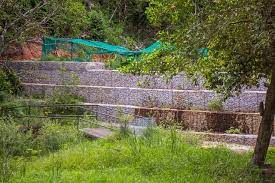Farmers of Mahe, Seychelles’ main island, will benefit from the increased water supply from a proposed water reservoir in Bon Espoir. Once the agriculture department finalizes the project farmers are expected to improve their agri-business.
As part of the project, a gabion will be erected to collect and store 1,000 cubic metres of water. A gabion is usually a cage filled with rocks, used to construct walls to contain soil and water. When used to seize water, gabions also serve as filtering dams. Additionally, gabions not only increase water storage capacity but also harness the resource.
Also Read: Seychelles: Grand Anse Mahe dam feasibility study & design enters final stage
Instead of letting the water flow down to the sea, the new water reservoir in Bon Espoir will provide an alternative water catchment facility. The gabion is becoming a popular system for harvesting water. It is a long-term project that is strong and durable.
Benefits of gabions in the construction of the new water reservoir in Bon Espoir
Before work on the project begins, farmers who are already getting their water in the area will have to relocate. Additionally, the new relocating area has been identified by the agriculture department. This will avert the water supply from having a high content of the soil. Importantly, failure to relocate the local farmers and remain connected to the wetland during construction, water supply will be contaminated.
The construction of the new water reservoir in Bon Espoir will take 6 months to complete. A similar project is to be undertaken on Praslin to handle water supply hitches on the second-largest island of Seychelles. Using gabion for water harvesting in national projects piloted in 2018 at the Bougainville.
Following the project in the wetland in the district of Takamaka in the south of Mahe, two more such reservoirs were built at Val D’en Dor and Baie Lazare. Such reservoirs increase resilience to climate change and benefit the water supply for human consumption, food security and livelihood. Such projects provide an alternative to desalination for potable water invention and the sustainability of the environment.
